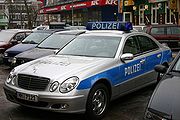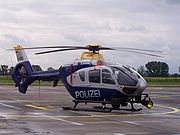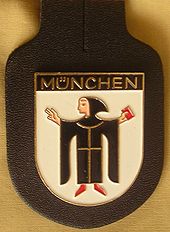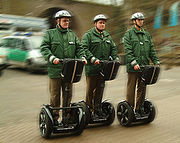
Landespolizei
Encyclopedia



State police
State police are a type of sub-national territorial police force, particularly in Australia and the United States. Some other countries have analogous police forces, such as the provincial police in some Canadian provinces, while in other places, the same responsibilities are held by national...
) are the main police forces
Law enforcement agency
In North American English, a law enforcement agency is a government agency responsible for the enforcement of the laws.Outside North America, such organizations are called police services. In North America, some of these services are called police while others have other names In North American...
of Germany. They are under the sole jurisdiction, funded and operated by the states of Germany
States of Germany
Germany is made up of sixteen which are partly sovereign constituent states of the Federal Republic of Germany. Land literally translates as "country", and constitutionally speaking, they are constituent countries...
.
History
The Landespolizei can trace its origins to 19th century Germany when the various prinicipalities maintained their own police forces, the two largest of which were the Prussian Secret PolicePrussian Secret Police
The Prussian Secret Police was the state police agency of the German state of Prussia in the 19th century and early 20th century.In 1851 Police Union of German States was set up by the police forces of Austria, Prussia, Bavaria, Saxony, Hanover, Baden, and Württemberg...
and the Bavarian State Police
Bavarian State Police
The Bavarian State Police has approximately 32,000 officers and roughly 5,600 civilian employees and is therefore one of the biggest police forces in Germany.-Organisation:The 10 regional police authorities in Bavaria are:...
. When Germany united into a single country in 1871, under Otto von Bismarck
Otto von Bismarck
Otto Eduard Leopold, Prince of Bismarck, Duke of Lauenburg , simply known as Otto von Bismarck, was a Prussian-German statesman whose actions unified Germany, made it a major player in world affairs, and created a balance of power that kept Europe at peace after 1871.As Minister President of...
, these police agencies became Landespolizei forces. Various towns and cities also maintained police forces as the increasing number of new laws and regulations made controlling urban life more complicated.
In Nazi Germany
Nazi Germany
Nazi Germany , also known as the Third Reich , but officially called German Reich from 1933 to 1943 and Greater German Reich from 26 June 1943 onward, is the name commonly used to refer to the state of Germany from 1933 to 1945, when it was a totalitarian dictatorship ruled by...
, all state and city forces were absorbed into the Ordnungspolizei
Ordnungspolizei
The Ordnungspolizei or Orpo were the uniformed regular police force in Nazi Germany between 1936 and 1945. It was increasingly absorbed into the Nazi police system. Owing to their green uniforms, they were also referred to as Grüne Polizei...
which existed from 1936 to 1945.
After World War II
World War II
World War II, or the Second World War , was a global conflict lasting from 1939 to 1945, involving most of the world's nations—including all of the great powers—eventually forming two opposing military alliances: the Allies and the Axis...
, massive numbers of refugees and displaced persons, hunger and poverty characterised everyday life in Germany. Attacks by armed gangs, robbery, looting and black-marketing were commonplace and the military police
Military police
Military police are police organisations connected with, or part of, the military of a state. The word can have different meanings in different countries, and may refer to:...
could not cope with this troubling security situation. So each of the Western Allies quickly permitted the formation of civilian police forces in Western Germany under terms that reflected their own police structures and traditions.
In all three Western zones, the emphasis was to decentralise, demilitarise and democratise the police. Some restrictions were lifted as Cold War tensions grew and certain police functions necessitated central rather than local direction. The Landespolizei became the police force for the federal states in the West.
East Germany created a unified national force in the form of the Volkspolizei
Volkspolizei
The Volkspolizei , or VP, were the national police of the German Democratic Republic . The Volkspolizei were responsible for most law enforcement in East Germany, but its organisation and structure were such that it could be considered a paramilitary force as well...
, however this was disbanded upon the reunification of Germany in 1990.
Organization
All state police forces are subordinate to the Land Minister of the Interior. The internal structures of these police forces differ somewhat (which makes generalizations subject to local variation), but usually immediately subordinate to the interior ministries are the regional police headquarters (called Präsidium in most states, Landespolizeidirektion in Baden-Württemberg). These direct operations over a wide area or in a big city and have administrative and supervisory functions.The Präsidium often has direct control of the force’s specialist units such as highway patrol
Highway patrol
A highway patrol is either a police unit created primarily for the purpose of overseeing and enforcing traffic safety compliance on roads and highways, or a detail within an existing local or regional police agency that is primarily concerned with such duties.Duties of highway patrols or traffic...
s, mounted police
Mounted police
Mounted police are police who patrol on horseback or camelback. They continue to serve in remote areas and in metropolitan areas where their day-to-day function may be picturesque or ceremonial, but they are also employed in crowd control because of their mobile mass and height advantage and...
detachments and canine
Police dog
A police dog, often referred to as a "K-9 dog" in some areas , is a dog that is trained specifically to assist police and other law-enforcement personnel in their work...
units.
Under the regional headquarters, there are several district police headquarters (Direktionen) serving communities of from 200,000 to 600,000 citizens. Subordinate to each Direktion, there are several local stations (Inspektion) or precincts (Revier) that are manned on a 24-hour basis, conduct day-to-day policing and serve as points of contact for local citizens. Below this level, the Polizeiposten is a small police office manned by one or two officers, normally only during office hours.
Territorial

Operational
State police forces are divided into the following operational sections:- SchutzpolizeiSchutzpolizeiThe Schutzpolizei , or Schupo for short, is a branch of the Landespolizei, the state level police of the German states. Schutzpolizei literally means security or protection police but is best translated as Uniformed Police....
("Schupo") - the uniformed police officers who patrol the streets and respond to emergency calls etc. - KriminalpolizeiKriminalpolizeiis the standard term for the criminal investigation agency within the police forces of Germany, Austria and the German-speaking cantons of Switzerland. In Nazi Germany during 1936, the Kripo became the Criminal Police Department for the entire Reich...
("Kripo") - the plain clothes detective branch, responsible for investigations. For instance, if a car is broken into, the Schupo will respond, secure the car, notify the owner etc, and then hand the case over to Kripo for investigation. - BereitschaftspolizeiBereitschaftspolizeiThe Bereitschaftspolizei are the support and rapid reaction units of Germany's police forces...
(BePo) - Uniformed units of the LaPo that provide additional manpower for natural disasters, sporting events or demonstrations. - LandeskriminalamtLandeskriminalamtLandeskriminalamt - is the German term for a State Investigation Bureau in Germany. LKAs are part of the state police which, in turn, is directly subordinate to the respective state ministry of the interior.-Investigations:...
(LKA) - State Investigation Bureau is directly subordinate to the state Ministry of the Interior, supervises police operations aimed at preventing and investigating criminal offences, and coordinates investigations involving more than one Präsidium. - WasserschutzpolizeiWasserschutzpolizeiThe Wasserschutzpolizei is the water police that patrols the waterways, lakes and harbours of Germany around the clock. The WSP are part of the Landespolizei ....
(WSP) - The river police for patrolling rivers, lakes and harbours. For practical reasons the WSP of one state may be in charge for territory of another state (e.g., in Hamburg, the WSP is in charge for the Elbe River in the states of Mecklenburg-Vorpommern, Lower Saxony, Schleswig-Holstein and Hamburg.) - SpezialeinsatzkommandoSpezialeinsatzkommandoSpezialeinsatzkommandos are the special response units of the German state police forces. German SEKs are full-time units whose members do not perform any other duties, and are essentially the equivalent of American SWAT Teams...
(SEK) - The SWATSWATA SWAT team is an elite tactical unit in various national law enforcement departments. They are trained to perform high-risk operations that fall outside of the abilities of regular officers...
teams of the German state police. - AutobahnpolizeiAutobahnpolizeiAutobahnpolizei is the term in Germany, Austria and the German-speaking parts of Switzerland for the highway patrol. Heavy traffic and high-speed accidents resulted in the creation of special police units to patrol the expressways known as Autobahnen....
- The highway patrolHighway patrolA highway patrol is either a police unit created primarily for the purpose of overseeing and enforcing traffic safety compliance on roads and highways, or a detail within an existing local or regional police agency that is primarily concerned with such duties.Duties of highway patrols or traffic...
in Germany.
Training
The individual Länder and the Federal Police conduct basic police training for their personnel. The length and thoroughness of this training contributes in large degree to the high level of police professionalism in Germany. Teaching all aspects of police work takes time but supports a “uniform career structure” that aims to avoid premature specialization, lets officers think in broad terms, makes career field changes easier and improves promotion opportunities.German citizenship is not required to be a police officer in Germany. Police departments in big cities are especially keen to recruit officers from ethnic minorities to reduce language and cultural barriers. However, minorities still make up less than one percent of officer numbers.
The Land police have had women members since the forces were reconstituted after World War II. Initially, female officers were only assigned to cases involving juveniles and women but in the mid-1970s they were allowed to become patrol officers. The proportion of women on patrol duty is set to rise as 40-50 percent of police school inductees are currently female.
Most police recruits are taken on directly after leaving school and spend about two and a half years at police school in combined classroom tuition and on-the-job training with police departments and the Bereitschaftspolizei
Bereitschaftspolizei
The Bereitschaftspolizei are the support and rapid reaction units of Germany's police forces...
. These people qualify as regular police officers and wear green (or light blue on the new blue uniforms) stars on their shoulder straps, denoting rank in the first echelon of the police service.
After duty as a patrol officer, someone with an outstanding record or wealth of experience can go on to two or three years at a higher police school or college of public administration to qualify for the upper echelon which starts with Polizeikommissar (one silver star) and ascends to Erster Polizeihauptkommissar (four or five silver stars). Direct entry candidates with the Abitur
Abitur
Abitur is a designation used in Germany, Finland and Estonia for final exams that pupils take at the end of their secondary education, usually after 12 or 13 years of schooling, see also for Germany Abitur after twelve years.The Zeugnis der Allgemeinen Hochschulreife, often referred to as...
high school diploma can also take these courses. Some states such as Hessen now train all their police officers for the upper echelon to improve pay and promotion chances.
The very few candidates who qualify for the police service’s executive ranks study for one year at a state police academy and then for another at the German Police University (Deutsche Hochschule der Polizei – DHPol) in Münster-Hiltrup where graduates earn a masters degree in police administration. Direct-entry candidates with a university degree only study for six months at the DHPol. The executive echelon begins with Polizeirat (one gold star) and culminates with the Land chief of uniformed police (gold wreath with one to three stars) or Federal Police chief (gold wreath with four stars). The DHPol that the states and Federal Interior Ministry administer jointly also provides specialized vocational courses for senior police personnel.
Appearance

Post WWII
From 1945 till 1979, the various Länder had a wide array of insignia and rank. Additionally, uniforms colours varied from green to blue, and various shades thereof. For example the City State of Hamburg police NCOs wore blue uniforms with inverted British style chevrons and the Schleswig Holstein police wore Green uniforms with Third Reich style rank. Bavaria maintained both a State Police (Landespolizei) as well as City Police (Gemeinde / Stadt) forces. Two separate and distinct uniforms were worn during this time by the state police (Green) and City Police (Blue). The last city police force was Munich, which was finally merged into the state police in 1975. This organization was also prevalent in the other American Sector states.Green uniforms
This confusing structure remained until the mid 1970s when a re-organization took place to clearly define the Police uniform and vehicle standards. This resulted in a new standard of green jacket, tan trousers and pale yellow shirts, and white hats, although the BGSBundesgrenzschutz
Bundesgrenzschutz was the first federal police organization in Western Germany after World War II permitted by the Allied occupation authorities. In July 2005, the BGS was renamed Bundespolizei to reflect its transition to a multi-faceted police agency.It was established in 1951...
wore green caps and trousers. This uniform was designed in 1976 by designer Heinz Oestergaard
Heinz Oestergaard
Heinz Oestergaard was a German fashion designer.He was considered one of the leading German fashion designer of the postwar period. After wins in Berlin, where he designed clothes for with Zarah Leander and Maria Schell...
.The sleeve patches and cap badges also were redesigned, the only difference was the display of the state crest in the center. Rank insignia was also changed to one standard style.
Vehicle markings were also redesigned to conform to a white and green livery with the legend “Polizei” in bold lettering. However, around 2000, another change occurred in the vehicles. They went from the green/white scheme to green/silver. However, during both changes BGS vehicles remained all green. Landespolizei tactical vehicles were painted a lighter shade of green all over.
Blue uniforms
Starting in 2002 a slow process of change began, this time moving away from the green uniforms to an internationally recognized blue uniform. The first state to convert to a blue uniform was Hamburg. One by one, other states followed suit. Cap badges, patches and rank remained the same as before, just in blue. Vehicle liveries also changed to a silver/blue design. The changes are still underway although more than 2/3 are already changed. At present (July 2010) the Saarland and Bavarian state governments still do not intend to convert to blue police uniforms.Exceptions
The BundeskriminalamtFederal Criminal Police Office (Germany)
The Federal Criminal Police Office of Germany is a national investigative police agency in Germany and falls directly under the Federal Ministry of the Interior...
(BKA - the German Federal Investigation Bureau) and the Bundespolizei (BPOL - Federal Police) are federal institutions that are not part of the Landespolizei.

